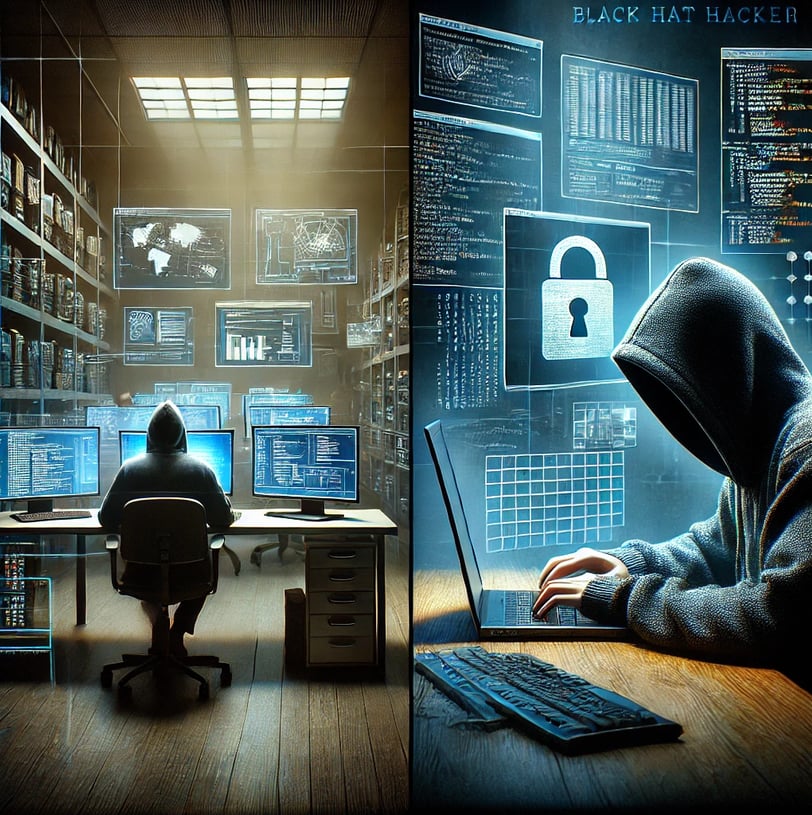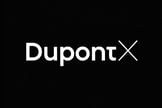Hackers: Heroes or Villains? The World of Cybersecurity and Its Different Profiles
The word "hacker" is often associated with cybercrimes, data theft, and system breaches. However, the world of hackers is far more complex than this simplistic view. There are hackers who work to protect systems, while others focus on exploiting vulnerabilities for personal gain or destruction. In this article, we explore the differences between ethical hackers (White Hats) and malicious hackers (Black Hats), their characteristics, notable incidents, and how we can defend ourselves against cyber threats.
3/6/20252 min read


Types of Hackers
White Hats - The Good Hackers
White Hats are cybersecurity experts who use their knowledge to strengthen systems and protect information. They work legally, often hired by companies and governments to test the security of networks and systems.
Key Characteristics:
Follow ethical rules and operate within the law;
Work for cybersecurity companies, governments, and corporations;
Conduct penetration testing to identify vulnerabilities before criminals exploit them;
Develop protection solutions against cyberattacks.
Black Hats - The Bad Hackers
Black Hats use their skills for illegal activities such as data theft, espionage, system breaches, and malware distribution. Their motivations range from financial gain and revenge to personal challenges.
Key Characteristics:
Operate outside the law and often sell stolen data on the dark web;
Create malware and ransomware to extort victims;
Hack into bank accounts, social media, and government systems;
May be associated with criminal organizations or even government-backed cyberattacks.
Gray Hats - The Middle Ground
Gray Hats fall between the two categories. They hack systems without permission but generally without malicious intent. Often, they report security flaws but may demand payment for their findings.
Notable Hackers and Historical Incidents
Good Hackers
Kevin Mitnick - A former Black Hat who became a security consultant and helped companies protect themselves from attacks.
Tim Berners-Lee - Creator of the World Wide Web, who used his expertise to democratize access to information.
Tsutomu Shimomura - Assisted in capturing Kevin Mitnick.
Bad Hackers
Anonymous - A decentralized group that carries out attacks against governments and corporations.
Albert Gonzalez - Responsible for stealing data from millions of credit cards.
Adrian Lamo - Hacked major company systems and exposed Chelsea Manning, a source for WikiLeaks.
Hackers and Nations
Countries such as the U.S., Russia, China, Iran, and North Korea have been linked to large-scale cyberattacks. Some governments fund hackers for espionage or to destabilize other nations.
Hackers Targeting Content Creators, Companies, and Professionals
In recent years, hackers have increasingly targeted content creators, companies, and freelancers, even those who use firewalls and modern antivirus software. This happens because:
Hackers exploit vulnerabilities in software and social networks, regardless of security measures;
Techniques like social engineering and phishing deceive users into revealing credentials;
Ransomware attacks continue to rise, encrypting vital data and demanding ransom payments;
Companies are targeted for confidential information theft and industrial espionage;
Content creators face account theft, demonetization, and digital profile hijacking.
No matter how advanced security systems are, the human factor remains the weakest link. Following best security practices is crucial to avoiding losses.
Dangers and How to Defend Yourself
Use strong passwords and two-factor authentication;
Keep software and antivirus programs updated;
Be cautious with suspicious emails and unknown links;
Avoid sharing personal data on social media;
Use VPNs when accessing sensitive information;
Avoid storing sensitive data in cloud services without encryption;
Regularly review app permissions and linked account accesses.
Conclusion
Hackers can be both digital security guardians and dangerous criminals. The difference lies in their ethics and intentions. Society must stay alert to protect itself from digital threats while recognizing the importance of professionals who work to ensure a safer online environment. Content creators, companies, and professionals should strengthen their security and remain vigilant against new hacking methods.
Explore
Discover diverse topics in one convenient hub.
Connect
Learn
contact@mindstormblog.com
© 2025. All rights reserved.


